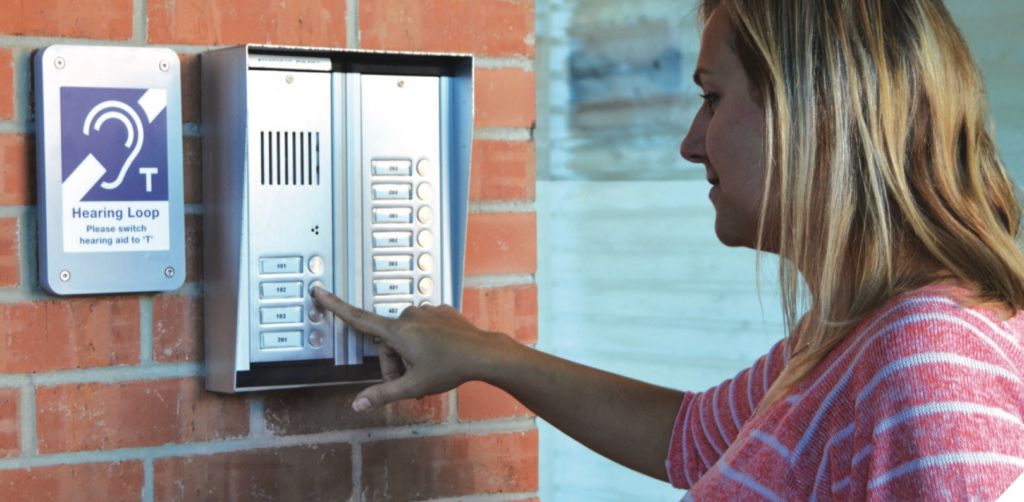
Imagine not being able to hear the speaker across the roar of a crowd, the bank cashier, or a bus driver over the noise of an engine. For 15% of American adults with some form of hearing loss, this is a daily reality. Hearing Loops for public facilities are more important than ever post-covid.
A hearing loop, also known as an assistive listening system or audio loop is a specialist sound system for those that use hearing aids. The ‘loop’ transmits an audio signal directly into a hearing aid enabling the wearer to hear sounds with reduced or eliminated background noise.
A loop consists of a microphone to pick up the spoken word or music; an amplifier that processes the signal which is then sent through the final piece; the loop cable, a wire placed around the perimeter of a specific area i.e. a service counter, a classroom, meeting room or theatre to act as an antenna that radiates the magnetic signal to the hearing aid.
While installation is relatively straightforward, the commissioning of systems is crucial to make sure that they are appropriately set up. Systems installed near each other can cause a ‘spill’ of a signal which interferes with reception such as in adjacent classrooms and lecture theatres, cinemas, or where there is a performance area for electrical instruments.
In the same way that being forced to work from home due to the worldwide crisis of COVID-19 sped up a new culture of digitising our workload, increased awareness for accessibility in society is another symptom of our post-pandemic existence. With many companies being forced to adapt to the accessibility requirements of their employees, all the big players followed to get ahead of the curve. Zoom added captions to its program for profoundly deaf employees forced to work from home, Microsoft made accessibility tools standard in Office programs such as PowerPoint, and LiveNation broadcasted concerts online to watch from the comfort of our homes. Moreover, the social distancing measures and mask-wearing catapulted a change in our approach to sanitation and cleanliness, which in turn has saved thousands of disabled people from serious illness and death.
All these moves by companies play a part in the shift of public perception and demand for equality of access. Whereas in 2019, and earlier, accessibility to many people simply meant a facility boasted a wheelchair ramp, the world has moved beyond that, despite there being laws being in place to protect the rights of disabled people for longer, such as the Americans with Disabilities Act.
Furthermore, it has been proven that disabled consumers are much more likely to trust and respect brands that recognise their differences, especially as increasingly conscientious consumers have more of a voice and platform than ever before thanks to the internet. However, despite brilliant efforts by companies to promote diversity of race, gender, culture, and sexual orientation, disabled consumers are still massively underrepresented in mainstream marketing. Very few businesses have direct strategies to tap into a market worth billions.

So, besides compliance with the law, a clear financial incentive, and an expansion of the respectability and visibility of your brand, what are other reasons to provide hearing loops?
Well, appropriately installed and operating loop systems are greatly welcomed by hard-of-hearing people. Some may feel self-conscious about their hearing loss, particularly if it is age-related, and prefer discreet operation. They might not even consider notifying a building manager if they wish to use the system to begin with, or if there is a fault. Therefore, if a business or facility dares to accommodate the needs of disabled people without being asked, they are much more likely to recommend a service or product to others they know, whether their friends are part of the demographic or not. The long-term positives, in addition to the fact it is simply the right thing to do, make installing devices for a growing hard-of-hearing population obvious.